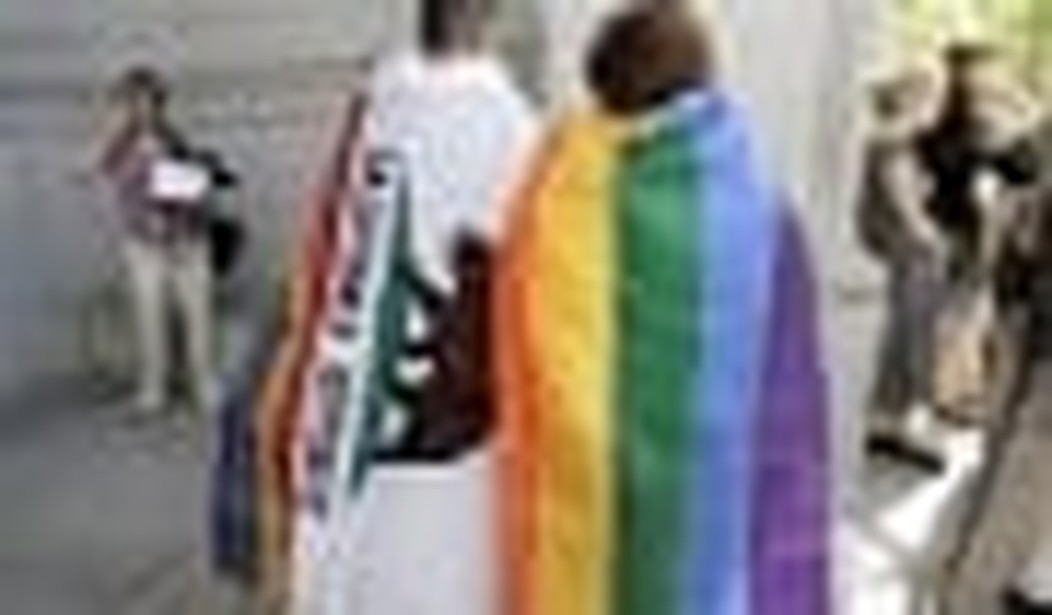A divided California Supreme Court today overturned statutes defining marriage as “between a man and a woman,” ruling that the “current California statutory provisions” limiting “marriage to opposite-sex couples” is unconstitutional.
The court found that, while existing domestic partnership legislation affords same-sex couples “virtually all of the same substantive legal benefits and privileges” and imposes “virtually all of the same legal obligations and duties,” it violates the state’s equal protection clause.
As a gay man who supports the ideas the institution of marriage embodies, I should be pleased. To some degree, I am grateful that this issue has received the attention it is getting, but I’m also troubled by the decision. To be sure, the court makes some valuable arguments about the merits of recognizing same-sex unions, but I believe those arguments should be made to the citizens of the Golden State, 62% of whom voted in 2000 to define marriage as the union of one man and one woman.
Going over the opinion, I appreciate the majority’s recognition that marriage is more than a right. It also involves the granting of state privileges while imposing certain responsibilities on the partners in the union. But the court overstepped its bounds in redefining (for purposes of state law) an institution which has long been limited to monogamous relationships between individuals of different genders. In a democracy, the people and their elected representatives should make decisions of this magnitude.
It’s not just the court’s bypassing the people’s will that troubles me, it’s also some things the court said about marriage. The court refuses to rely upon the “historical” understanding of marriage, noting that “prohibitions on interracial marriage” are also part of the historical record. What it neglects to mention is that those laws were statutory creations, while the historical understanding of marriage as a union between one man and one woman goes back for millennia.
The court sees marriage as “a substantive right of two adults who share a loving relationship to join together to establish an officially recognized family of their own.” But marriage has long been more than just a loving relationship. Such a definition would suggest that two friends — or even siblings — could marry.
The court goes on to make much of the notion of dignity:
One of the core elements of the right to establish an officially recognized family that is embodied in the California constitutional right to marry is a couple’s right to have their family relationship accorded dignity and respect equal to that accorded other officially recognized families, and assigning a different designation for the family relationship of same-sex couples while reserving the historic designation of “marriage” exclusively for opposite-sex couples poses at least a serious risk of denying the family relationship of same-sex couples such equal dignity and respect.
Unless I missed it, the court did not cite the constitutional provision according such dignity.
Recognizing marriage has not — at least not until recently — been about according dignity to any couple in any loving relationship. It has long been a social institution joining together two individuals of different genders in a monogamous bond to promote a stable environment for the raising of children. Indeed, as I pointed out in a recent post, in all cultures (up until the present day) that recognize marriage, sexual difference has been “the defining aspect of the institution.” To be sure, some cultures allowed for same-sex marriages, but, in those cases, one of the partners had to live in the guise of the opposite sex in societies far more sexually stratified than our own.
All that said, I do believe marriage can evolve to include same-sex unions. Indeed, that evolution is already taking place. As gay and lesbian couples meet the obligations traditionally assigned to marriage and live together in monogamous relationships that are more than just loving, then we will find these unions treated as marriage.
But this evolution should happen naturally and not be imposed by a court. Advocates need to defend the merits of the institution rather than focus on the rights they believe are their due. Unless these advocates make their case to the people, they will find the people blocking the evolution of marriage beyond its traditional definition.
This already happened in the wake of the Massachusetts Supreme Judicial Court’s 2003 Goodridge decision recognizing same-sex unions as marriage in the Bay State. Shortly after this decision was handed down, opponents of gay marriage succeeded in placing referenda on state ballots amending their various constitutions to include the traditional definition of marriage.
Even before today’s decision, advocates of the traditional definition of marriage have gathered enough signatures to place a referendum on this fall’s Golden State ballot which would amend the state’s constitution to ban recognition of same-sex marriage. I fear that with the court having short-circuited the legislative and initiative process, the chances of that ban passing increased today.
We need a conversation on marriage, not just arguments before courts in the various states. This conversation should not only help elucidate why gay people merit the benefits state recognition accords married couples, but also why marriage is beneficial for all people. Unless we have that conversation, our society will remain divided on the issue. Too many people will continue to believe that when gay couples seek the benefits of the ancient and honorable institution, they don’t recognize its obligations nor understand its meaning.
B. Daniel Blatt blogs at GayPatriot.









Join the conversation as a VIP Member